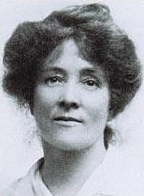Ada Nield Chew facts for kids
Quick facts for kids
Ada Nield Chew
|
|
|---|---|
 |
|
| Born |
Ada Nield
28 January 1870 North Staffordshire, England
|
| Died | 27 December 1945 (aged 75) Burnley, England
|
| Nationality | British |
| Occupation | Suffragette, Social Activist |
| Spouse(s) |
George Chew
(m. 1897–1940) |
Ada Nield Chew (born January 28, 1870 – died December 27, 1945) was a brave British woman. She fought for women's right to vote. She also worked hard to improve conditions for factory workers.
Contents
Ada Nield Chew's Life Story
Early Life and Family
Ada Nield was born on January 28, 1870. Her family lived on a farm in North Staffordshire, England. She was one of 13 children! Ada left school at age eleven. She helped her mother care for their large family and home.
Fighting for Fair Pay
When Ada was in her twenties, she worked as a tailor. She made uniforms in a factory in Crewe, Cheshire. Ada saw how badly women and girls were treated. They were paid much less than men. The factory even charged them for tea breaks and work materials.
In 1894, Ada wrote letters to the Crewe Chronicle newspaper. She used the pen name "A Crewe Factory Girl." Her letters bravely spoke out against the unfair working conditions. She said women deserved a "living wage," not a "dying wage."
Becoming a Social Activist
The factory owners found out Ada was "A Crewe Factory Girl." She was fired from her job. But her letters caught the eye of the Independent Labour Party (ILP). This political group worked for the rights of working people. They offered Ada a job.
Ada quickly became very active in the ILP. By the end of 1894, she made history. She was elected as a Nantwich Poor Law Guardian. This meant she helped manage aid for poor people in her area. She was one of the first working-class women to hold such a position.
In 1896, Ada traveled around England. She spoke from a special "Clarion Van." This helped spread the ILP's ideas to many people.
Marriage and Family Life
In 1897, Ada married George Chew. He was also an organizer for the ILP. Their only child, a daughter named Doris, was born the next year.
In 1900, Ada became an organizer for the Women's Trade Union League. She worked with Mary Macarthur. This group helped women workers get better rights and conditions.
Working for Women's Right to Vote
Before the First World War, Ada became a strong supporter of women's suffrage. This was the movement to get women the right to vote. Ada was a working-class woman. Sometimes, she felt that the middle-class leaders of the movement didn't fully understand her experiences.
She even had lively discussions with Christabel Pankhurst in The Clarion newspaper in 1904. Ada joined the National Union of Women's Suffrage Societies. From 1911 to 1914, she worked as an organizer for them. Her main goal was to get support for women's voting rights from other working-class people.
Peace Activism During Wartime
During the First World War, Ada believed in peace. She was a pacifist, meaning she was against war. She joined groups like the Women's International League for Peace and Freedom. These groups worked to stop the war.
Later Life and Legacy
After the war, women finally gained the right to vote in 1918. Ada then stepped back from major political roles. However, she still worked to improve the lives of working-class women. She focused on their health, diet, and working conditions.
Ada also started her own mail-order business called Chew & Co. She also ran a health food store. This was because she was a vegetarian. She retired from her business in 1930. In 1935, she took an amazing trip around the world.
Ada's husband passed away in 1940. Ada Nield Chew herself died on December 27, 1945, in Burnley, Lancashire. Her ashes were scattered in Rochdale Cemetery. Her daughter, Doris, later collected and published some of Ada's writings.
Remembering Ada Nield Chew
Archives and Interviews
You can find an oral history interview about Ada. It was done with her daughter, Doris Nield Chew. This interview is kept at The Women's Library. It is part of a larger collection of interviews. These interviews share stories from the suffragette and suffragist movements.
Public Recognition
Ada Nield Chew's name and picture are honored in London. They are on the base of the statue of Millicent Fawcett in Parliament Square. This statue was unveiled in 2018. It celebrates 59 women who supported women's right to vote.
Images for kids
 | Laphonza Butler |
 | Daisy Bates |
 | Elizabeth Piper Ensley |


